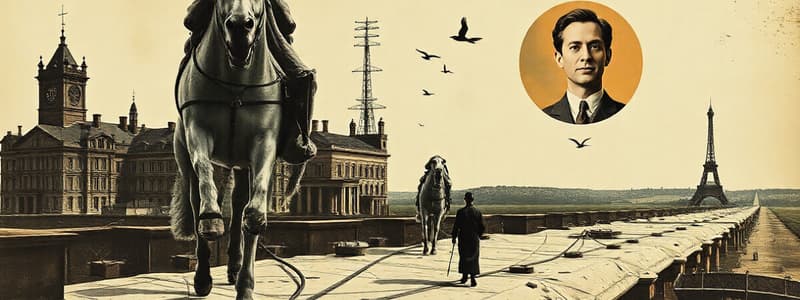Podcast
Questions and Answers
What is the primary distinction between a 'Very Good' and a 'Good' introduction, regarding the background information in a performance task?
What is the primary distinction between a 'Very Good' and a 'Good' introduction, regarding the background information in a performance task?
- A 'Very Good' introduction is significantly shorter than a 'Good' introduction.
- A 'Very Good' introduction always includes a relevant image, while a 'Good' introduction does not.
- A 'Very Good' introduction contains detailed background information, while a 'Good' introduction contains some background information. (correct)
- A 'Very Good' introduction explains the problem, while a 'Good' introduction only states it.
What is the key attribute that differentiates a 'Very Good' conclusion from a 'Good' conclusion in the context of a performance task?
What is the key attribute that differentiates a 'Very Good' conclusion from a 'Good' conclusion in the context of a performance task?
- A 'Very Good' conclusion restates the central issue, while a 'Good' conclusion introduces a new related topic.
- A 'Very Good' conclusion avoids personal opinions, while a 'Good' conclusion includes emotional appeals.
- A 'Very Good' conclusion presents opinions and logical suggestions for change, while a 'Good' conclusion provides some suggestions for change. (correct)
- A 'Very Good' conclusion is longer and more detailed than a 'Good' conclusion.
In evaluating the 'Body Paragraphs' section of a performance task, what distinguishes 'Good' from 'Poor'?
In evaluating the 'Body Paragraphs' section of a performance task, what distinguishes 'Good' from 'Poor'?
- A 'Good' body paragraph is concise, while a 'Poor' paragraph is lengthy and rambling.
- A 'Good' body paragraph presents an argument with supporting examples, while a 'Poor' paragraph presents an argument but lacks examples. (correct)
- A 'Good' body paragraph avoids personal opinions, while a 'Poor' paragraph relies on emotional appeals.
- A 'Good' body paragraph uses colorful language, while a 'Poor' paragraph uses simple language.
If a student's introduction to their performance task only vaguely defines the problem and lacks detail, which performance level would the introduction most likely receive, according to the rubric?
If a student's introduction to their performance task only vaguely defines the problem and lacks detail, which performance level would the introduction most likely receive, according to the rubric?
A student presents an argument in the body paragraphs of their performance task, but the argument lacks supporting examples. Which performance level would this most likely represent?
A student presents an argument in the body paragraphs of their performance task, but the argument lacks supporting examples. Which performance level would this most likely represent?
Which of the following best describes the core components of media literacy?
Which of the following best describes the core components of media literacy?
In the context of media literacy, what does 'analysis' primarily involve?
In the context of media literacy, what does 'analysis' primarily involve?
Buckingham and Livingstone (2005) define media literacy as 'Having access to the media, understanding the media, and creating/expressing oneself using the media.' What foundational skill enables all these aspects?
Buckingham and Livingstone (2005) define media literacy as 'Having access to the media, understanding the media, and creating/expressing oneself using the media.' What foundational skill enables all these aspects?
When evaluating a media message, asking 'What lifestyles, values system, perspective, point of view are represented in this message? Conversely, what is omitted?' primarily helps in:
When evaluating a media message, asking 'What lifestyles, values system, perspective, point of view are represented in this message? Conversely, what is omitted?' primarily helps in:
Which of the following actions exemplifies 'responding' within the framework of media literacy?
Which of the following actions exemplifies 'responding' within the framework of media literacy?
If a person is able to locate several news sources online but struggles to differentiate between a credible news article and misinformation, which aspect of media literacy needs improvement?
If a person is able to locate several news sources online but struggles to differentiate between a credible news article and misinformation, which aspect of media literacy needs improvement?
Which scenario best demonstrates the application of media literacy skills in a real-world context?
Which scenario best demonstrates the application of media literacy skills in a real-world context?
In what way does media literacy empower individuals in their interaction with information?
In what way does media literacy empower individuals in their interaction with information?
Which of the following best demonstrates the 'evaluate' stage of information literacy?
Which of the following best demonstrates the 'evaluate' stage of information literacy?
A student is working on a presentation about the impact of social media on society. Which action exemplifies digital literacy?
A student is working on a presentation about the impact of social media on society. Which action exemplifies digital literacy?
A local community group wants to raise awareness about environmental issues. Which initiative best integrates media, information, and technology literacy?
A local community group wants to raise awareness about environmental issues. Which initiative best integrates media, information, and technology literacy?
What is the main purpose of technology literacy?
What is the main purpose of technology literacy?
A researcher needs to find credible sources for a paper on the effects of climate change. Which strategy demonstrates strong information literacy skills?
A researcher needs to find credible sources for a paper on the effects of climate change. Which strategy demonstrates strong information literacy skills?
A student is assigned to create a multimedia presentation. How do they demonstrate technology literacy?
A student is assigned to create a multimedia presentation. How do they demonstrate technology literacy?
What is the relationship between media literacy, information literacy, and technology literacy?
What is the relationship between media literacy, information literacy, and technology literacy?
What constitutes the 'apply' stage in information literacy?
What constitutes the 'apply' stage in information literacy?
Flashcards
Literacy
Literacy
The ability to read and write and possess education.
Media
Media
Means of communication that reach or influence people widely.
Media Literacy
Media Literacy
Ability to access, analyze, and respond to various media forms.
Access (in Media Literacy)
Access (in Media Literacy)
Signup and view all the flashcards
Analysis (in Media Literacy)
Analysis (in Media Literacy)
Signup and view all the flashcards
Response (in Media Literacy)
Response (in Media Literacy)
Signup and view all the flashcards
Information
Information
Signup and view all the flashcards
Key Questions of Media Literacy
Key Questions of Media Literacy
Signup and view all the flashcards
Introduction
Introduction
Signup and view all the flashcards
Body Paragraphs
Body Paragraphs
Signup and view all the flashcards
Conclusion
Conclusion
Signup and view all the flashcards
Very Good Performance
Very Good Performance
Signup and view all the flashcards
Needs Improvement
Needs Improvement
Signup and view all the flashcards
Information Literacy
Information Literacy
Signup and view all the flashcards
Technology
Technology
Signup and view all the flashcards
Digital Literacy
Digital Literacy
Signup and view all the flashcards
Evaluate Information
Evaluate Information
Signup and view all the flashcards
Communication Tools
Communication Tools
Signup and view all the flashcards
Technology Literacy
Technology Literacy
Signup and view all the flashcards
Performance Task 1 (PT1)
Performance Task 1 (PT1)
Signup and view all the flashcards
Study Notes
Media and Information Literacy
- Media literacy is a set of skills and knowledge.
- It involves accessing, analyzing, and responding to a range of media, including print, moving images, and multimedia texts.
- Media literacy includes three key elements: Access, Analysis, and Response.
- Access involves knowing where to find forms of media and having technical competence to navigate technology changes.
- Analysis includes critically thinking about media content, considering its implications, and reflecting on the perspectives presented.
- Response entails experiencing and exploring the pleasures and language of media.
Information Literacy
- Information is anything that informs or enables understanding. It can be an answer to a question or a news report.
- Information can be obtained through investigation, study, or instruction.
- In everyday language, information refers to data, code or text. This data is delivered, received, modified or conveyed in various formats.
- Information literacy involves recognizing when information is needed and locating, evaluating, using effectively and communicating in various formats.
Technology Literacy
- Technology is the practical application of scientific knowledge to change the human environment.
- Technology includes machinery and equipment developed for practical and beneficial uses, improving human life.
- Technology also involves knowledge of tools, techniques, systems and organizational methods.
Technology (Digital) Literacy
- Digital literacy is the ability to use technology appropriately and effectively.
- Using technology to access, manage, evaluate, create and communicate is included in digital literacy.
- Understanding and using technology tools, communication tools and various networks is a key part of digital literacy.
Media and Information Literacy Defined by UNESCO
- UNESCO defines Media and Information Literacy (MIL) as a set of competencies allowing citizens to:
- Access, retrieve, understand, evaluate, create, and share information and media content.
- Use various tools and formats in critical, ethical and effective ways.
- Participate in personal, professional and societal activities.
Media and Information Literacy's Key Questions
- Who created this message?
- What creative techniques were used to attract attention?
- How might different people understand the message?
- What viewpoints are represented in the message and what's omitted?
- Why was this message created?
Performance Task I (PTI)
- Students need to write an essay about the importance of media and information literacy.
- The essay should have a title, introduction, a body paragraph with 2 examples illustrating the main argument, and a conclusion.
- The essay should be more than 12 sentences. Refer to the rubric for grading criteria.
Rubric for Performance Task I
- The rubric defines criteria for a good introductory paragraph, body paragraph and conclusion when writing an essay on media and information literacy.
Studying That Suits You
Use AI to generate personalized quizzes and flashcards to suit your learning preferences.




